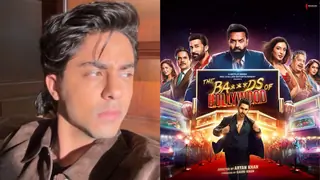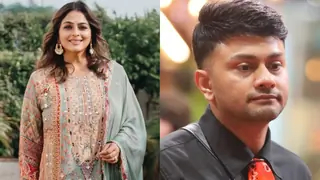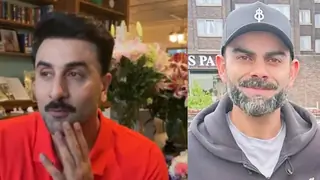One Haider is not enough
I no longer don the uniform. But I did once, in the year the recently released movie Haider is set. And in the same place, the Kashmir Valley. I may have been young then, and Haider may be a work of fiction, but I did come across many characters Vishal Bhardwaj and Basharat Peer have crafted for the movie. More significantly, I was a part of the environment the movie is set in, and may have even shaped it in my own little way.
First the movie. I have watched Haider and it is political. It is neither a documentary nor is it a propaganda film. The political undertones are subtle at most places but the movie sporadically erupts into making overtly political statements: disappeared people, half-widows, unmarked graves, AFSPA, the army's creation of counterinsurgent group, Ikhwaan and perhaps the most controversial of them all, the torture scenes.
To anyone who has read Basharat Peer (author of Curfewed Night) or other "Kashmiri" writers, this should not come as a surprise. It is the standard viewpoint of middle-class, educated young men from Srinagar who came of age in the early 1990s, when the militancy was at its peak in the state. The movie stays true to that political viewpoint and captures many truths of that period. But it is not the complete truth. To think that this movie tells you everything you need to know about Kashmir would be fallacious. We will perhaps need another half a dozen movies just to scratch the surface of the many truths of Kashmir.
As per reports, the movie was given a U/A certificate after 41 cuts by the Censor Board. It would be fascinating to see what those cuts were, because I fear that they perhaps gave the movie the political correctness it ends up with.
The movie starts with a caption "Srinagar, India 1995". To use "Srinagar, India" and not "Srinagar, Kashmir" the way other Bollywood movies (like Roja) have done was a significant statement to make even before the movie started. The ending, where the protagonist ends up forsaking revenge to terminate the unending cycle of violence --- and the nods to the futility of revenge earlier during the movie --- seem almost contrived. As if the censors wouldn't pass the movie if it didn't end with the politically correct message. To be or not to be.
Of course, no Indian movie can have Indian Army as the villain and so the movie ends up depicting the pro-India counterinsurgency group, Ikhwaan as the evil guys. That's the closest --- by proxy --- Peer and Bhardwaj could have come to showing India and Indian Army as being the bad guys. Subtle but well done and par for the course for a political movie. So what was the truth about Ikhwaan-ul-Muslimoon?
Everything the movie says about Ikhwaan is perhaps true. The group was supported by the Indian Army and operated alongside it. It countered terror with terror of its own against Pakistan-backed terrorists and their over ground supporters. Ikhwaanis illegally felled timber and sold it (Koka Parray acknowledged that in an interview to Harinder Baweja of India Today in 1995), extorted money from shopkeepers, street vendors and even bus-passengers at checkpoints it established. It also probably did things much worse than that. After all, these Ikhwaanis had been trained in Pakistan, had operated as terrorists and knew how to fleece the Kashmiris for personal benefits.
Why did Indian Army prop up Ikhwaanis under Koka Parray? Koka Parray was a folk-singer from Hajan who was trained in PoK and later surrendered after being with the Hizbul Mujahideen. Till 1994, he was a small-time informer for the infantry battalion at Manasbal, who gained such prominence by 1995 that he was being courted by top military commanders and politicians. Koka Parray was a prized asset not only because he could do the dirty job for the army, but because he was the only one to provide a breakthrough in a war India seems to be losing --- or at best, not winning --- in Kashmir.
Ikhwaanis provided intelligence, intimate local knowledge and understanding of the militant tactics which the army didn't possess. The success was immediate and reflected in the parliamentary elections of 1996. Most people forget that even Farooq Abdullah had boycotted the 1996 Lok Sabha polls, anticipating that they will be a stunning failure. The 'success' of 1996 Lok Sabha polls encouraged Dr. Abdullah to participate in the 1996 Vidhan Sabha elections, which led to resumption of the political process and Kashmir's slow march towards normalcy.
What was India like in early 1990s? It was still recovering from the economic crisis and politically, it was in great turmoil. Babri Masjid had been demolished by the Sangh Parivar, Rajiv Gandhi had been assassinated by the LTTE, Mandal Commission had opened cleavages in the society, militancy was still at its peak in Punjab, and serious charges of corruption (from Harshad Mehta and payment to JMM MPs to Urea Scam) were levelled against PM Narasimha Rao.
Internationally, the Cold War had ended with the disintegration of India's strategic ally, the USSR. Pakistan had been at the forefront of defeating the Soviets in Afghanistan, and the world's sole superpower owed Pakistan a few favours. So much so that Robin Raphael, First Assistant Secretary of State for South and Central Asian Affairs under President Clinton, was actively supporting Kashmiri separatism and helped form the Hurriyat as a political face of the Pakistan-fuelled militancy in Kashmir. In those pre 9/11 days, there was no global consensus against Islamist terror. India felt under siege, both at home and abroad. It is in these circumstances that the Indian establishment took to Ikhwaan as a tactical succour. And however loathe we might be to acknowledge it today, the coming in of Ikhwaanis turned the tide in India's favour. It was not the best option but as anyone who has served in counterinsurgency knows, there are no good options in counterinsurgency. You always choose the least bad option and perhaps Ikhwaan was the least bad option at that time.
It must be reiterated though that whether due to Kashmiri politics or due to Indian apathy, the Ikhwaanis were soon marginalised and ceased to exist, both as a counterinsurgent group and as a political force in the Valley. Praveen Swami's obituary in Frontline magazine of Koka Parray after his killing by two Hizbul terrorists in 2003 adequately captures the decline of Ikhwaan in the state. That reinforces my belief that Ikhwaan wasn't a strategic choice exercised by the Indian Army but only a tactical ploy to overcome a very difficult situation at a specific time. Weren't Petraeus and other American generals hailed for doing the same in Iraq?
On AFSPA, even if we concede that the law was needed at the peak of militancy in Kashmir in the 1990s, there is no reason for it to still be applied to urban areas of Kashmir at the current levels of violence. Chief Minister Omar Abdullah has cogently made the case but to little avail. Let's hope the new, unfearing government at the Centre will have the courage to take that bold step and send a message to Kashmir which its predecessor governments failed to do.
The interrogation centre in Haider is called Mama-2, a clever nod to the now-mythologised interrogation centre called Papa-2 in Srinagar. But the movie gets it wrong. Papa stands not for father but for the phonetic word associated with letter P; if it started with letter M, the place would be called Mike and not Mama. Frivolities aside, Papa-2 was run by BSF --- not the army though it got intelligence ascertained from militants detained there --- and closed down in 1996. Did torture happen in Papa-2 or in other detentions by the security forces?
There is no reason to believe that it didn't happen but such incidents (as those of 'fake encounters') came down dramatically after the 1996 assembly elections. It is something which ideally shouldn't have happened but when people are sucked in the vortex of an ugly conflict, ugly things happen. The question of justice for those who suffered in that conflict --- innocents, militants, sympathisers, security force personnel, Kashmiri Pandits, families --- is a vexed one. Should it be "retributive" justice or "restorative" justice advocated by Mandela in South Africa? Can time heal all the wounds? If so, how much more time do we need? These are complex questions in any conflict and in case of Kashmir, almost impossible to find simple answers to.
For all his craftsmanship, Vishal Bhardwaj makes some silly errors in the movie which I couldn't fail to notice. The yellow table tennis balls, used by a young Haider and his father in a flashback scene, came into use much later. White balls were used during the period of the movie. The soldiers move around with INSAS rifles in the movie set in 1995 when these weapons were introduced only in 1997. The vehicles used by the Indian Army in 1995 were not the ones soldiers use in the movie. The stars on the collar dogs for Brigadiers and above were introduced in 2000s and a Brigadier (portrayed by Ashish Vidyarthi in the film) couldn't have worn them in 1995. Indian Army didn't have a RPG-7 in its inventory and the RL-84 Rocket launchers that it used never set buildings to fire. They just drilled holes through the walls.
Often, houses where militants were holed in were set to fire by the soldiers as a matter of last resort by late evening to prevent escape of militants under the cover of darkness. At times, explosives were used by soldiers in daring moves to blast such houses. Of course, grenades never cause fire in such high intensity but that is a problem of depiction with Hollywood too. Suicide vests, using Chinese grenades, might be a cinematic device used here because suicide bombing and fidayeen attacks started a couple of years after 1995 when HuM, HuA and LeT became dominant players in the terror game in Kashmir. And yes, Srinagar was no way as clean and tidy then as shown in the movie. It was a dark, dirty, gloomy place which is unimaginable now.
These nitpickings aside, Haider is a movie we should welcome whole-heartedly. More than the quality and the message of the movie, the fact that such a political movie can be made and released in this country is something we should be justifiably proud of. Let a thousand more Haiders bloom.
A retired army officer, the author served in the Kashmir Valley from 1994 to 1997.






















0